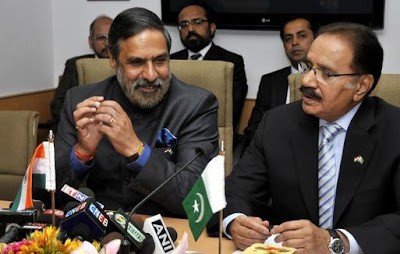 |
| Union Minister for Trade and Commerce Anand Sharma with Pakistan's Commerce Minister Makhdoom Amin Fahim |
About two months ago, the governments of India and Pakistan signed three memorandums of understanding aimed at facilitating trade. The idea was to lower tariffs, speed up the process of doing quality checks on goods and to make it easy for businessmen of both countries to get visas.
While one memorandum called for visa rules to be liberalized so that businessmen of both countries could visit as many as 10 cities in the other country, access remains restricted to three cities.But politics is once again interfering in the flow of trade—and people—in the subcontinent. This time, in the world of textiles.
“In the tradition of India-Pakistan relations, where we start and stop and start and stop and start, the momentum has stopped for now,” said Bashir Mohommad, head of the International Textile Manufacturers Association, a trade body based in Zurich, Switzerland.
Mr. Mohommad is also chairman of Gul Ahmed Textile Mills Ltd., one of the largest textile and retail companies in Pakistan. He spoke with India Real Time on the sidelines of a textile and apparel conference organized earlier this week in Mumbai by consulting firm Technopak.
One invitee who couldn’t make it to the conference, however, was Syed Naved Husain, chief executive of the Beximco Group, the largest private sector company in Bangladesh.
Reason: Mr. Husain’s visa for India had not come through, despite having applied for it around four weeks ago.
India complains about its citizens not get travel permits but it seems to causing similar problems to citizens of countries, including the chief executives of companies.
“Don’t link the textile sector with diplomatic channels,” says Arvind Singhal, chairman of Technopak. “Don’t link everything with the Bombay attacks [of 2008],” one of the most common reasons cited for the lack of movement.
To be sure, there is a number of reasons—political, geographic, current or historical tensions—that are held up to justify restrictions by either side.
What that boils down to in real life is that it takes Pakistani companies nearly a month by sea to send its goods to Bangladesh. It would take less than that if those goods were sent by road or train through India, says Mr. Mohammod.
Another reason Indians like to offer up for keeping their doors shuttered is that imports could flood the Indian market and decimate local producers. But seeing that India imports barely $300 million of overall goods from Pakistan—of which textile is a miniscule, negligible part—that’s hardly a plausible concern for the Indians. (India exported nearly $2 billion of goods for the year that ended March 31, 2011.)
Technopak’s Mr. Singhal compares this to the paranoia that gripped the U.S. when it was readying the North American Free Trade Agreement in the early 1990s.
“Mexican goods did not take over the American markets, now, did they?” he says.
All the more reason, he says, that opening up borders for the textile sector could be a great goodwill gesture by India that could win it brownie points across the border and internationally.
Brahma Chellaney, a professor of strategic studies at the Center for Policy Research, a New Delhi think tank, is more skeptical.
“Politics drives economics,” says Mr. Chellaney. “In no part of the world do you have clear divisions between the two.”
Pakistan is yet to grant India the status of most-favored nation, which would allow low tariffs and high import quotas, among other things, although India granted it that in the 1990s.
“This [MFN status] is the most basic element of bilateral relationships,” says Mr. Chellaney. Without granting that, “then to talk about textile concessions not coming through is putting the cart before the horse.”
Pakistan had agreed last fall to give India MFN status but that caused a backlash among some conservative elements in Pakistan. Islamabad switched to a more cautious approach and decided to wait until next year to change the status.
Instead, in a confidence-boosting measure, Pakistan scrapped a system of limiting imports from India to fewer than 2,000 items. It moved instead to a “negative list,” which bans around 600 items from India but allows trade in all other goods. Then earlier this year Islamabad said it would scrap this negative list by Jan. 1, 2013 to help normalize trade.
But tensions have once again risen between the nuclear-armed neighbors in the last few weeks.
India wants Pakistan to move ahead with the trials of seven Pakistani militants it has charged with the attacks on Mumbai in 2008, which killed more than 160 people.
Late last month India Confirmed it was questioning Sayed Zabiuddin Ansari, alias Abu Jindal or Abu Hamza, an Indian man believed to have acted as the handler for the 10 Pakistani gunmen who laid siege to Mumbai over three.
Next, Mr. Chidambaram claimed interrogation of Mr. Ansari, who was deported to India from Saudi Arabia, proved Pakistan’s intelligence services were involved in the Mumbai attacks.
Mr. Ansari reportedly told Indian interrogators, he was in a control room in the Pakistani city of Karachi during the attacks. He also said Pakistani intelligence officers were involved. Pakistani officials denied the claims.
Mssrs. Mohommad and Singhal say the governments need to move beyond this thinking and open up borders for trade.
“Flow of trade will be the catalyst for peace,” says Mr. Mohammod.
But that seems to be easier said than done.
Edited By Cen Fox Post Team

































